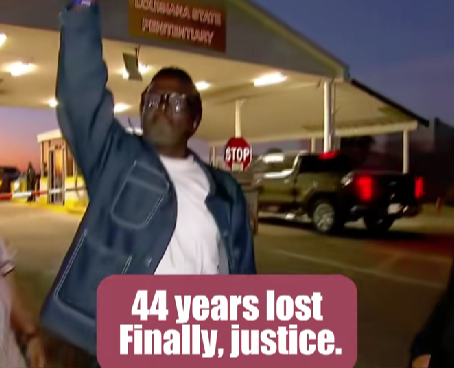After spending 44 years behind bars for a crime he didn’t commit, a Louisiana man is finally free. The image of him walking out of prison — head high, fist raised — has become a powerful symbol of resilience, hope, and long-overdue justice.
The man, now 68, was convicted in 1979 for an armed robbery and m*rder he had always maintained he was innocent of. With little evidence and a flawed investigation, the case against him rested largely on mistaken eyewitness testimony — a factor that has been linked to countless wrongful convictions over the decades. Despite his pleas of innocence, he was sentenced to life without parole and sent to one of the nation’s most notorious prisons, the Louisiana State Penitentiary at Angola.
For more than four decades, he refused to give up hope. From his prison cell, he wrote letters to lawyers, innocence organizations, and journalists — anyone who might listen. Finally, after years of silence, his case was taken up by the Innocence Project, a nonprofit dedicated to freeing those wrongfully convicted.
Through a re-examination of evidence and witness testimony, attorneys discovered inconsistencies that had been ignored during the original trial. New forensic analysis and key recantations from witnesses finally led to his exoneration. A judge vacated his conviction last week, ruling that “justice delayed is justice denied — but justice must still be done.”
When the gates of Angola opened, he walked out wearing the same calm dignity that had carried him through 44 years of suffering. Cameras captured his emotional moment of freedom — his arm raised high in triumph, tears in his eyes, and a quiet smile of disbelief on his face. “They took my freedom,” he told reporters, “but they never took my faith.”
Family members who had waited decades for this day embraced him tightly. His sister, who had been a child when he was first imprisoned, said through tears, “We prayed for this day our whole lives. He’s finally home.”
The case has reignited national conversations about wrongful convictions and the failures of the criminal justice system. Experts say his story is part of a much larger problem — one that continues to destroy lives. “There are likely thousands of innocent people still sitting in prison today,” said a spokesperson from the Innocence Project. “Cases like his remind us that the system is far from perfect, and real people pay the price.”
Now, as a free man, he faces the daunting task of rebuilding a life that was taken from him. He missed birthdays, funerals, and decades of technological change — but he says he’s not bitter. “I’m just thankful to be alive to see this day,” he said.
His first stop after leaving prison was to visit his mother’s grave, where he whispered, “I’m free, Mama.”
Forty-four years lost. But after a lifetime of waiting, justice — though late — finally came.
